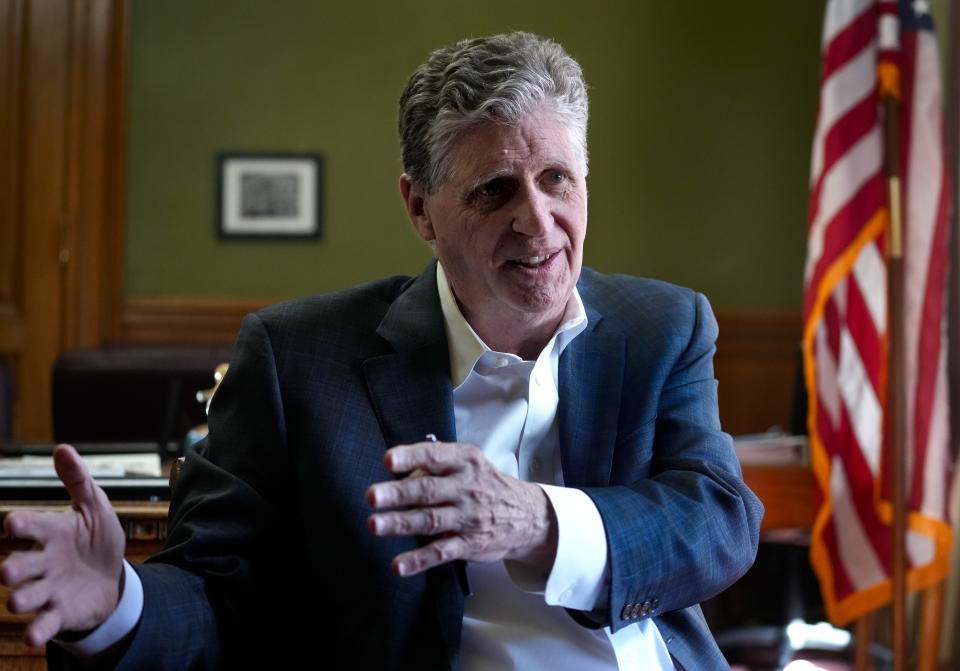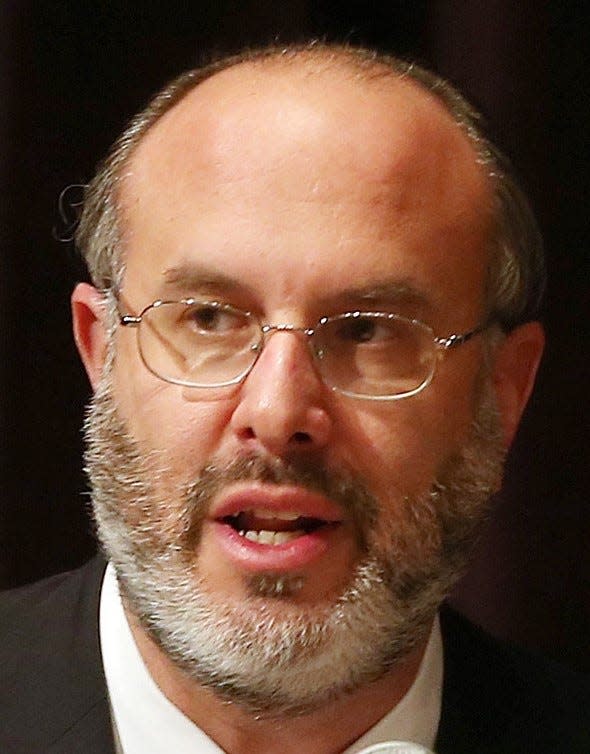What will McKee talk about in his State of the State? His big focus is raising incomes.
- Oops!Something went wrong.Please try again later.
A promise from Rhode Island Gov. Dan McKee:
Within the next 100 days, he will unveil a plan for raising Rhode Islanders' incomes and personal wealth.
The state's highest-ranked Democrat gave The Journal a preview last week of his Tuesday "State of the State" speech, and he said to stay tuned for details on how he plans to fulfill his promise. Tax cuts? More assists for home-buyers? What the politicians call "pathways to jobs"?
McKee said his "raising incomes" plan will hinge at least in part on winning voter approval to borrow enough money to build a dedicated home for Rhode Island College's fledgling cybersecurity institute and new "life sciences" facilities at the University of Rhode Island.
Connecting the dots during a sit-down in his State House office, McKee predicted the investments would provide students at RIC and URI with the kind of schooling they would need to get jobs in growing industries that would, in turn, enable them to stay in Rhode Island instead of moving to other states to find jobs.
"The cybersecurity school that we've opened up at Rhode Island College is new, and it's going to be incredibly important to the state as well as Rhode Island College," McKee said Wednesday. "We're going to ask the people to be investing in facilities that will support that, and at URI, the life science facility."
Price tags for the RIC and URI projects have not been set, and McKee would not say exactly how large the new higher education bond might be.
But the proposed expansion of URI's life sciences programs would build on the $45 million budgeted this year to fund a new state biotech hub and the $82 million being spent on a new State Health Lab in Providence. And the state's trade unions love any new government-funded construction.

What does McKee mean by 'life sciences'?
Life sciences is one of those Big Idea phrases that can mean a lot of different things.
In September, when Brown University announced city approval of its proposed 300,000-square-foot, 7-story "life sciences building" on Richmond Street in the heart of the Jewelry District, the school said it would "include state-of-the-art laboratory space for researchers in biology, medicine, brain science, bioengineering and public health."
When he talked about "life sciences," McKee ruled out one option: the creation of a second medical school in Rhode Island, in addition to Brown University's highly regarded Warren Alpert Medical School.
But he was not ready to talk about the kinds of jobs that he hopes would emanate from a new-and-expanded URI life sciences program.
McKee said the idea is "not completely formed yet, but we know that we've made a $45-million investment. ... We know that there's jobs in that life science area. And we know that it's [time] to really be ... investing in the education that is going to help support the job growth that's going to be coming over the next decade."
A snippet from the URI proposal says: "The life sciences project will not only provide laboratory and office space to support important research, but the construction of this new facility will also help free capacity in several other buildings, including Avedisian Hall, the Beaupre Center, and the [existing] Center for Biotechnology and Life Science, to support other mission-critical initiatives."
More: Who are the highest paid state employees? This list has some surprises
What about cybersecurity?
The cybersecurity institute was launched last fall with former U.S. Rep. Jim Langevin, a longtime advocate for investment in cybersecurity, at the helm.
McKee said the institute's new home could be in a new building or in a retrofit of an existing facility on the RIC campus. The aim: to create a "dedicated space for cybersecurity, artificial intelligence (AI), and other emerging technologies" that will – he hopes – make RIC a regional leader in "workforce development."
"This is a big deal," McKee said. "I am asking for 1,000 students to be in that school within five years, graduating 250 kids a year into six-figure jobs. We know 73% of the graduates from RIC stay in Rhode Island."
Why this focus? "Nationally, over 715,000 employees are needed in this industry, which is projected to grow by 31% by 2029."
Voters can expect another new housing bond
McKee said he also intends to ask voters to approve another state housing bond.
Housing Secretary Stefan Pryor has requested $100 million for affordable-housing programs, but McKee would not say whether his plan includes more or less than that amount.
The only specific McKee gave on his housing proposal is that it will include a program to encourage homeownership.
Last year, McKee used $30 million in federal pandemic aid to provide up to $17,500 in down-payment assistance to first-time homebuyers. More than 1,400 buyers received money under the program, according to the McKee administration.

Looking ahead to what he has in mind, he again talked about connecting dots between homeownership and "raising incomes and personal wealth."
His words segue from one goal to another: "We want to make sure that we're providing paths for individuals, our kids ... our sons and daughters, our grandkids, to have a path to housing that leads them eventually to home ownership. "
His thinking: If "you want to raise incomes, you need to build facilities, whether it's education or whether it's housing, that keeps people in the state that we know that our kids are leaving."
'We're going to raise incomes'
McKee believes he set the stage for this year's goal by making education his top agenda item last year, when he rolled out his "Learn365RI" plan, which involved getting local communities to agree to support after-school programs in support for funding.
To illustrate his strategy, McKee has copies of the 38 local Learn365RI agreements sitting in a pile on his desk in his State House office with URI, RIC and CCRI hats on top.
"This time we're going to be basically making a statement that we're going to raise incomes and we're going to raise equity or personal wealth in households across the state," he said.
It's a big, broad statement, but when asked if it would allow Rhode Island taxpayers to keep more of their own income through a tax cut, he cited the business tax relief measures he proposed – and the General Assembly approved – last year.
This year? "We'll have another small business package in there," he promised.
Again, details to come, but McKee says to expect a "focus on eliminating several duplicate licenses/fees" and "support to help MBE’s [minority business enterprises] get certified with the state so they can be successful in our procurements."
What about health care?
In the hugely important health care arena, where patients are struggling to find doctors and some hospitals are struggling to pay bills, McKee kept his plans close to his vest.
McKee declined to say, for example, whether the new state budget he proposes will include significant increases in spending to raise Medicaid reimbursement rates for a whole swath of health care providers, doctors and hospitals.
But his office disclosed approval from the U.S. Centers for Medicare and Medicaid Services to use $287.9 million to create "better rate parity between commercial health insurance and Medicaid rates." (That includes $199.3 million in federal funding and $88.6 million in state dollars).
More: Inflated by federal funds, state spending ballooned. Now, this group is sending out a warning.
"Since Medicaid rates are often lower than commercial insurance rates, these new payments will help lessen the gap between rates and provide hospitals with additional financial support," spokeswoman Kerri White told The Journal.
This was money state lawmakers were already counting on when they approved this year's $14-billion budget last June.
The math is a bit complicated, but this is the net result, according to an administration summary: "These new payments, combined with changes to other supplemental payments and taxes in the enacted budget, result in over $110 million in new Medicaid funding to the state’s hospitals" in the current budget year.
And pension COLAs?
On the push by Rhode Island's retired public employees for the reinstatement of annual pension increases, McKee said he is waiting to hear General Treasurer James Diossa's recommendations on how best to help public sector workers and retirees affected by the 2011 pension cuts championed by his predecessor, Gina Raimondo.
But "I do believe in some way ... you've got to find a path to address that issue," he said. "How long can people go without [a cost-of-living adjustment) COLA when they were depending on the COLA?"
More broadly, he said the budget will include a "strategy for relief related to retirement income" targeted at all retirees. Details to come.
Asked whether he plans to propose additional spending to fill a gap in the Rhode Island Public Transit Authority's budget, McKee hinted there would be some new funding, but that it might come with strings attached.
"There will be some funding that'll be appropriated ... [but] we agree with [DOT Director and RIPTA Board Chairman Peter Alviti Jr.] that there needs to be a fiscal analysis of the operation."
Why does McKee support a plan to move RIPTA's central bus hub from Kennedy Plaza to former I-195 land outside the downtown business district?
"I think that when we get [the bus hub plan] finalized, the details will show that it is centralized in a way that brings people to jobs and also makes sure that – look, the economy is the most important thing that we're dealing with right now," he said. "We're not going to try to put it out in Siberia at someplace. We're going to make sure that it's centralized in a way that we are addressing the economic goals that we put in place."
About the size of the budget he will propose to lawmakers on Thursday? Will it be smaller than the current $14-billion spending plan that ballooned with billions in pandemic-era federal relief?
He didn't answer directly, but said: "I think there's adjustments that are going to have to be made where the federal dollars are no longer there."
He said his spending plan will "take care of all our contractual, all our legal issues that we're sitting on, and then making sure that we're funding our education in a way where we can continue the progress that's being made."
The governor's annual State of the State address will be Tuesday at 7 p.m., broadcast on Capitol Television.
This article originally appeared on The Providence Journal: McKee says he wants to raise incomes in Rhode Island ahead of State of the State

